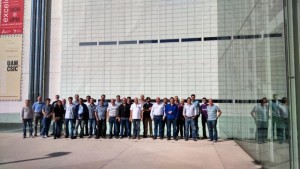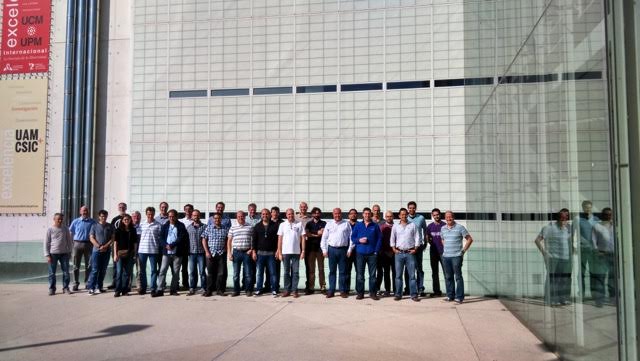- The project is the result of collaborative work between 23 entities from 9 European countries
- It represents a significant advancement in capacity and flexibility of telecommunication operators’ optical transport networks
The European IDEALIST project held its final plenary meeting in Madrid, where the final results of the work were shared.
The IDEALIST project (Industry-Driven Elastic and Adaptive Lambda Infrastructure for Service and Transport Networks) emerged with the aim of developing flexi-grid technology for optical networks. After 3 years of work, IDEALIST has confirmed the promises of this technology: it not only improves the scalability and flexibility of telecommunication operators’ transport networks but also reduces their costs. 
Currently, telecommunication operators use optical transceivers in their transport networks with no flexibility: they work on a fixed wavelength, with fixed modulation, and transmit to a single destination. Recent advances in optical transmission technology have allowed the development of fully flexible transceivers that can change their modulation, vary the width of the optical spectrum they use, or transmit to multiple destinations simultaneously. This is what is called SBVT, or Sliceable Bandwidth-Variable Transceiver, and it is the heart of flexi-grid optical networks.
This flexibility allows the network to dynamically adapt to changes that may occur (variations in traffic, fiber cuts, etc.), something that is unthinkable in current networks. This great capacity for dynamic adaptation has led to the coining of the term elastic optical networks to refer to these technologies.
The validation of flexi-grid technology
After 36 months of work and more than 200 published articles, this final plenary meeting presented the experiments carried out within the framework of the project. These experiments have covered diverse aspects such as data transmission and interoperability between different manufacturers, automatic connection establishment, re-optimization of the optical spectrum, use of an automatic planning tool, dynamic adaptation of connections to changes in traffic, etc.

The result has been a complete validation of flexi-grid technology, which will allow, in the near future, optical networks with very high capacity connections (1 Tb/s) and the ability to automatically respond to changes in traffic or link failures, all with maximum utilization of the optical spectrum of the fibers.
The result of collaborative work from the 7th Framework Program
Naudit, as a member of the project, acted as host for the meeting held at the Madrid Science Park, headquarters of the Spanish start-up.
Led by Telefónica I+D, 23 entities participated in the project: operators (Deutsche Telecom, Telecom Italia, British Telecom), equipment manufacturers (Alcatel Lucent, Cisco, Coriant, etc.), start-ups (Old Dog Consulting, Naudit, etc.) and universities and research centers (CNIT, CTTC, UPC, Univ. of Bristol, Univ. of Patras, Univ. of Eindhoven, etc.). The IDEALIST project has benefited from collaborations throughout Europe: Germany, Spain, France, Greece, Netherlands, Italy, Poland, Portugal and the United Kingdom.
The project, which began in 2012, has been funded by the European Union under the Seventh Framework Program.
More information: http://www.ict-idealist.eu/













































